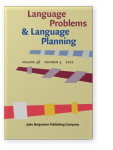Vol. 46:3 (2022) ► pp.318–348
Between two fires
Linguistic justice vs language policy at a South African higher education institution
This article focuses on the advocacy of social justice through the implementation of language policies in South African universities. Noting the multilingual complexity of South Africa with 11 [1] 1 official languages and the intricacies surrounding South Africa’s political and sociocultural borders, the submission explores the advocacy of social justice in informing the reappraisal and the ensuing implementation of such a language policy by exploring constitutive dimensions (specifically identity) and instrumental dimensions (non-identity/functional aspects) from a linguistic justice perspective. The institution used as a case study is the North-West University (NWU) which is a by-product of three campuses that were merged in 2004. The authors use survey data eliciting opinions about revising the institution’s language policy. Central to the analysis is how linguistic justice could be exercised in consideration of constitutive vs instrumental dimensions based on the work of De Schutter (2007). With 20, 000 responses, the authors used a qualitative analysis, supplemented by frequencies, to tease apart identity and non-identity aspects to determine which of these had a closer relationship with linguistic justice and the selected institution’s language policy. The results of this study aim to offer insight into future revisions of higher education language policies in order to fulfil the mandate of linguistic justice.
Article outline
- Introduction
- Linguistic justice and language policy
- Language policy in South African public higher education institutions
- Data collection and analysis
- Qualitative approach
- Results and discussion
- Conclusion
- Acknowledgements
- Notes
-
References
